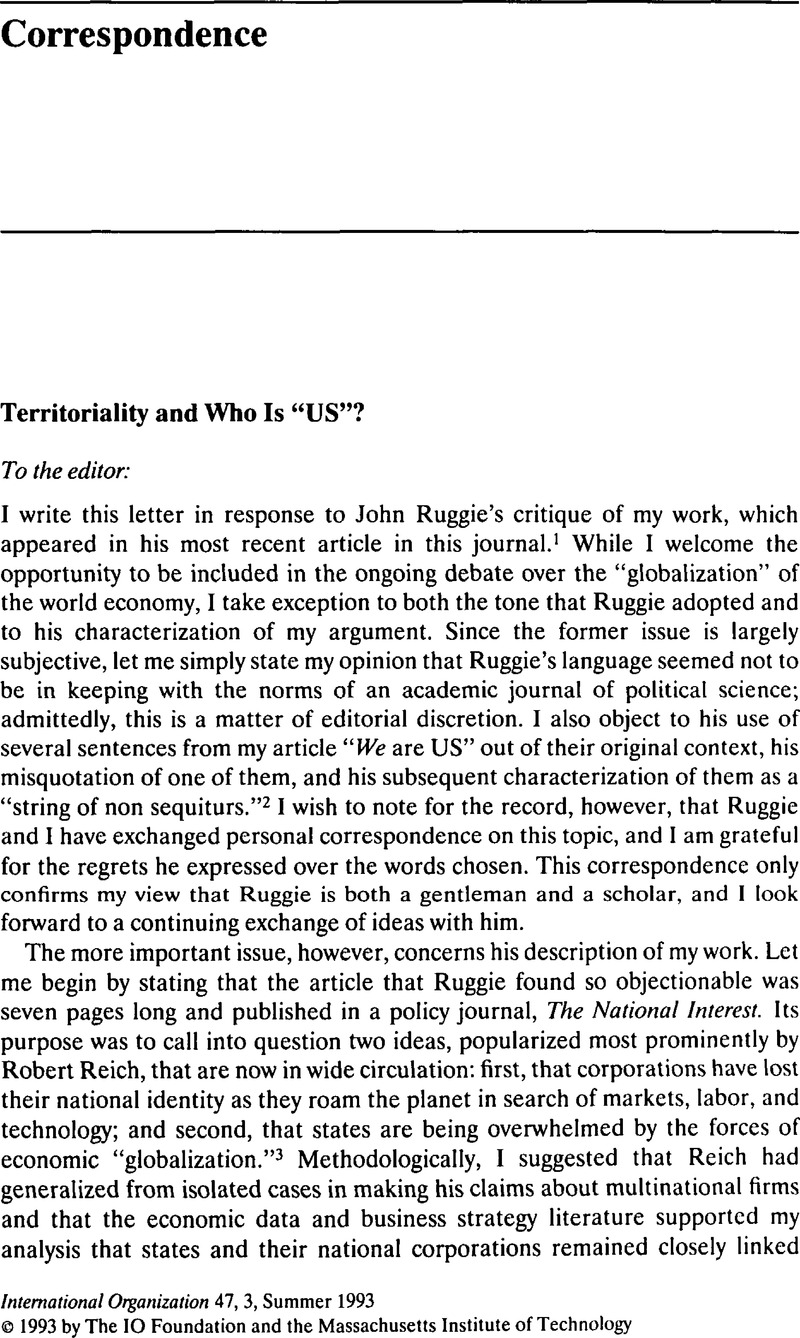Article contents
Territoriality and Who Is “US”?
Published online by Cambridge University Press: 22 May 2009
Abstract

- Type
- Correspondence
- Information
- Copyright
- Copyright © The IO Foundation 1993
References
page 503 note 1 Ruggie, John Gerard, “Territoriality and Beyond: Problematizing Modernity in International Relations,” International Organization 47 (Winter 1993), pp. 139–74CrossRefGoogle Scholar.
page 503 note 2 Kapstein, Ethan B., “We are US: The Myth of the Multinational,” The National Interest (Winter 1991/1992), pp. 56–62Google Scholar. Ruggie's critique appears on pp. 142–143 of his “Territoriality and Beyond.”.
page 503 note 3 Reich, Robert, “Who is US?” Harvard Business Review (January–02 1990)Google Scholar.
page 503 note 4 See Kapstein, Ethan B., “Resolving the Regulator's Dilemma: International Coordination of Banking Regulations,” International Organization 43 (Spring 1989), pp. 323–47CrossRefGoogle Scholar; and Kapstein, Ethan B., “Between Power and Purpose: Central Bankers and the Politics of Regulatory Convergence,” International Organization 46 (Winter 1992), pp. 265–87CrossRefGoogle Scholar.
page 503 note 5 Ruggie, , “Territoriality and Beyond,” p. 143Google Scholar.
page 503 note 6 Ibid., p. 141.
page 503 note 7 For an early expression of this viewpoint, see Huntington, Samuel, “Transnational Organizations in World Politics,” World Politics 25 (04 1973), pp. 333–68CrossRefGoogle Scholar.
page 503 note 8 Ruggie, , “Territoriality and Beyond,” p. 141, emphasis originalGoogle Scholar.
page 503 note 9 My thoughts on the state response to international banking are further developed in my book, Governing the Global Economy: International Finance and the State (Cambridge, Mass.: Harvard University Press, forthcoming)Google Scholar. I do not believe that Ruggie has seen the manuscript of this book, but he would have had access to my earlier articles on banking, as well as my recent monograph, “Supervising International Banks,” Princeton Essays in International Finance, no. 185, Princeton University, 12 1992Google Scholar.
page 503 note 10 For more on this point, see Kapstein, Ethan B., “International Collaboration in Armaments Production: A Second-best Solution,” Political Science Quarterly 106 (Winter 1991/1992), pp. 657–76CrossRefGoogle Scholar.
page 505 note 1 Ruggie, John Gerard, “Territoriality and Beyond: Problematizing Modernity in International Relations,” International Organization 47 (Winter 1993), pp. 139–74CrossRefGoogle Scholar.
page 505 note 2 Ibid, p. 142.
page 505 note 3 Ibid, p. 155. For the quotation from Becker, see Becker, Marvin B., Medieval Italy: Constraints and Creativity (Bloomington: Indiana University Press, 1981), p. 15Google Scholar.
- 7
- Cited by


